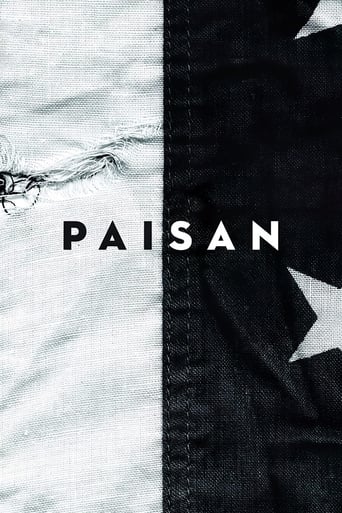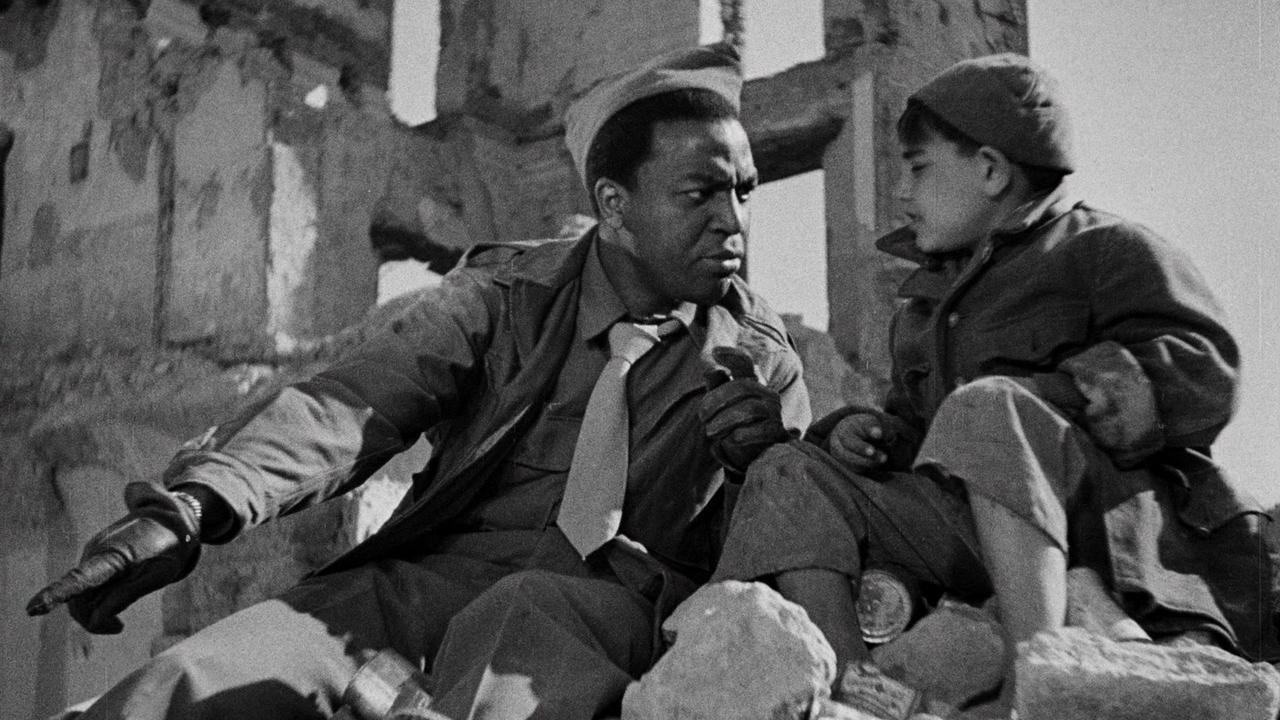Turfseer
In Roberto Rossellini's first film of a war trilogy, Rome Open City, he chronicled the effect of Nazi occupation on the denizens of Rome. Here he's more concerned with the interaction between the occupying American soldiers and Italians. Paisan is an unusual film for its time in that a good part of the dialogue is in English spoken by off-Broadway actors imported to Italy to play American soldiers; and even more innovative is the fact that Paisan features six separate episodes that are tied together by the theme of miscommunication brought about by war and the ensuing ironies inherent in a story that features a clash between two very different cultures.Perhaps the most devastating episode is the first one. The American reconnaissance patrol only has one translator to sort out the conflicting voices in a small Sicilian village and we learn early on that the Americans will have a hard time understanding their reluctant Italian hosts. After employing a local girl, Carmela, as their guide, the Americans end up in the ruins of a deserted seaside castle—they leave a private, Joe, a regular guy from New Jersey, with Carmela at the castle where they attempt to communicate despite not knowing each other's language.Things take a tragic turn when Joe is shot by a German sniper and the Germans occupy the castle. Carmela shoots at the Germans in revenge for Joe's death and she herself is captured and thrown off the cliffs by the Germans. The ultimate miscommunication occurs after the Americans return and ironically (and incorrectly) conclude that Carmela was the one who killed Joe.As we head north, the second episode is set in the port city of Naples. It is remarkable in that it features an African-American actor (Dots Johnson) playing a non-stereotyped part as Joe, an Army MP (this is 1946 when it was unheard of for a black actor to obtain such a "normal", non-offensive role). When we first meet Joe, he's intoxicated and confesses to Pasquale, a young street urchin he's befriended, that he doesn't want to go home (owing to the racism of the times back in the US). After waking up from his drunken stupor, he discovers that Pasquale has stolen his shoes and after running into the kid again the next day, he's determined to find the boys' parents and have them return his shoes.The irony in this episode becomes clear when Pasquale brings Joe to where he lives and tells him that his parents were killed by allied bombs. In an epiphany, Joe finally has sympathy for Pasquale, realizing that his own personal struggle with racism pales in comparison to the boy who sadly lost his parents—he thus drives off and drops his useless obsession in attempting to recover the shoes.We now move to Rome in the third episode. Fred (Gar Moore) is a G.I. who meets a prostitute, Francesca, who brings him back to a room. He reminiscences about a woman he had met six months earlier when the Americans first liberated the city—Fred has idyllic memories of this woman and wishes he could see her again. Through his description, Francesca ironically realizes that Fred doesn't recognize her and she is the woman Fred met six months ago. Her attempt to reveal her true identity goes awry when she hands an address to the building superintendent and asks her to give it to Fred when he wakes up. Fred later discards the address thinking it's just the address of another brothel ruining any chance for romance between the two in the future. Again, it's the ineluctable effect of war that leads to heartache and disappointment. The fourth episode involves two characters, American nurse Harriet (Harriet Medin) and a partisan Massimo (Renzo Avanzo), who seek to enter a besieged section of the city of Florence, defended by partisans who are trying to beat back the Germans. Harriet's motive is to hook up with the partisan leader Lupo whom she has known in the past and perhaps is in love with. Massimo simply wants to re-connect with family members. As they move from street to street, dodging bullets, they are constantly advised to turn back by other partisans. The irony is that their motives appear selfish, considering that at the end of their sojourn, one of the partisans is shot on the street by a sniper, directly as a result of their foolish desire to satisfy their own whims.The fifth and perhaps most enigmatic episode involves three US Army chaplains, a Catholic, a Protestant and a Jew, who visit a recently liberated Roman Catholic monastery. The Jewish chaplain notes that the priests in the monastery are cut off from the reality of war. Ironically, the priest's spirituality is marred by petty prejudice as they are shocked by the presence of the Protestant and Jewish chaplain. During the meal, only the Americans eat, while the bigoted priests fast in the hope their non-Catholic guests will repent and perhaps someday convert. Leave it to Captain Bill Martin (William Tubbs), the Catholic chaplain, to surprisingly toast his hosts, whom he apparently forgives and still admires for their devotion to faith.The last episode must be compared with the first where the Americans completely misread the Italians and--through suspicion brought on by the realities of war--arrive at an erroneous conclusion signaling the gulf between the two cultures. It's the last episode, ironically, where Italians partisans are now working directly with American OSS agents--despite the tragic ending where the Germans drown the partisans and the Americans die also in a show of solidarity, the interaction between Italians and Americans have come full circle. Rossellini emphasizes the bond between the two peoples as they fight a common enemy.Paisan is a must-see which mixes documentary footage and a Neo-realist narrative to great effect.
elvircorhodzic
PAISAN is structurally omnibus. It consists of six different stories unfolding in Italy during the Italian campaign. Basically all the stories have common motifs and themes. Linguistic, cultural, religious and environmental barriers between the allied troops and the Italian population. The atmosphere and scenery are targeted certain to demonstrate the consequences of the war through the destruction of the fascists, hunger, poverty, crime, prostitution and unified pain. I could go on forever to convey thoughts, but the truth is that this movie is difficult to explain. Italian neorealism in action. Almost on the verge of a documentary. Therefore act so real and true. Improvisation in acting and dialogue is more than obvious. This film has a sad and empty tone. A bit of conscience, maybe. Each story can be seen as a random incident that accompany disappointment, irony and fear. Relations between people in times of war are also credible processed.After each story, I asked for some ulterior motive. In the end I realized that in fact nothing is puzzling. Stories are very simple and clear. Each is finished without superfluous words.Nothing here is not too dramatic, nor is it connected. Without culmination and turning. The effect is quite disturbing. In war everything is clear, everything is acceptable and that fact sound frightening
gavin6942
Communication is fragile. A woman leads an Allied patrol through a mine field; she dies protecting a G.I., but the Yanks think she killed him. A street urchin steals shoes from a G.I. who tracks him to a shanty town. A G.I. meets a woman the day Rome is liberated; in six months they meet again: he's cynical, she's a prostitute. A US nurse braves the trip across the Arno into German fire in search of a partisan she loves. Three chaplains, including a Jew, call on a monastery north in the Apennines. Allied soldiers and partisans try to escape capture in the marshes of the Po.Rossellini engaged six writers, each of whom was to write one episode: Klaus Mann, Marcello Pagliero, Sergio Amidei, Federico Fellini, Alfred Hayes, and Vasco Pratolini. Each episode took place in a different location. The script notwithstanding, Rossellini often improvised with the actors and rewrote the stories as they were being filmed. For the first episode filmed in Sicily, Rossellini discarded the script and coached the non-professional, illiterate lead actress Carmela Sazio to a performance that received critical praise.I love the variety of views on World War II. What is especially interesting is how we start with the point of view of the Allies. For much of the war, Italy was not an Ally but was ruled by Mussolini, who gravitated towards Hitler. (Though Italy was the least "evil" of Germany, Japan and Italy.) So this film seemingly champions the recent enemy...
finchy9-976-77969
The film Paisan from Roberto Rossellini is a very influential film in terms of it truly expressed Italian neorealism. The film itself deals with the poor soldier class during World War II in Nazi Germany as they are basically losing the war against the Allied forces. I got this sort of authenticity from the film though just because Rossellini went with non-professional actors which is very common in Italian neorealism films. Because most of these actors were probably soldiers during World War II it gave me a better view of what the characters actually went through in terms of how they experienced the war and it just made the movie more authentic which is what you want in a film like this. It was a relatively long movie, split up into six different chapters, and all the dialogue is spoken in Italian. The Italian dialogue has it's ups and downs for me in terms of, yes, this is an Italian neorealist film so the basic language should be Italian. But for me being of a newer, younger generation these types movies can be hard to sit through just because my generation is used to the violent action packed cinema. And while I really enjoyed Inglourious Basterds (which is like 2/3 in another language besides English) it still just makes the watching experience that much longer and unenjoyable. So my only complaint in this movie is the Italian dialogue with English subtitles, but overall it gets the point across. And I now have a set example of how an Italian neorealist movie is made.


 AD
AD

